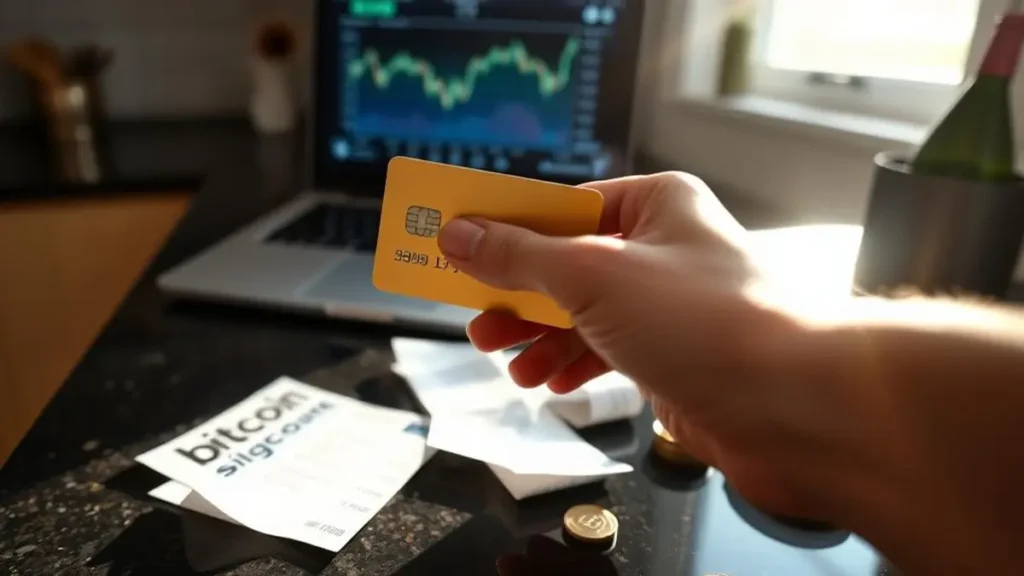Crypto Rewards Credit Cards: Your Guide to Earning Crypto Back
These cards also serve as an educational gateway to cryptocurrency for beginners, allowing them to gain familiarity with digital assets through a familiar financial tool. Learn more about crypto debit and credit cards
How to Choose the Right Crypto Rewards Card
When selecting a crypto rewards credit card, start by comparing reward rates. Most cards offer between 1-5% back in crypto, with some providing higher rates for specific spending categories like dining or entertainment.
Pay close attention to fee structures. Look for:
- Annual fees (some premium cards charge $100+ annually)
- Foreign transaction fees
- Cryptocurrency conversion fees
- Withdrawal or transfer costs
Security features should be a priority. The best cards offer robust fraud protection, secure crypto storage solutions, and clear policies on what happens if your card is compromised.
You can also familiarize yourself with how AI helps secure next-generation credit cards (AI and Biometric Credit Cards Explained) [https://uslifestyles.org/biometric-credit-card-ai-security].
Many cards operate on a tiered system that allows you to earn crypto points at higher rates based on your spending level or amount of cryptocurrency staked with the platform. For example, Crypto.com’s Visa Card offers rates from 1% to 8% based on how much CRO (their native token) you stake.
The exchange or platform partnership is also important, as it affects which cryptocurrencies you can earn and how easily you can manage your rewards.

Strategies to Maximize Your Crypto Rewards
To get the most from your bitcoin cashback card, focus on bonus categories. Many cards offer enhanced rewards (3-5% instead of 1-2%) for specific types of spending like groceries, travel, or subscription services. If you’re a travel enthusiast consider options like the best credit cards for travel.
Take advantage of promotional offers and introductory bonuses. Some cards provide generous sign-up bonuses worth hundreds of dollars in cryptocurrency after meeting initial spending requirements.
Consider these reward-maximizing tactics:
- Use your card for recurring bills and subscriptions
- Consolidate family spending on one card when beneficial
- Time large purchases with promotional reward periods
- Combine with merchant-specific discounts for double savings
Develop a strategy for managing your earned crypto. Some users prefer to hold rewards long-term, betting on price appreciation, while others immediately convert to stablecoins or fiat currency to lock in value. Read about top crypto cards [https://www.coingecko.com/learn/top-crypto-cards].
Important Risks and Considerations
Market volatility represents the most significant risk with crypto rewards credit cards. Unlike traditional cash back, the value of your rewards can decline substantially during market downturns. A $50 reward earned today could be worth significantly less tomorrow.
Regulatory uncertainty is another important consideration. The legal landscape surrounding cryptocurrency is still evolving in many countries, and future regulations could impact how these cards operate or how rewards are taxed.
Tax implications for crypto rewards can be complex. In many jurisdictions:
- Earning crypto rewards may be considered taxable income
- Converting between cryptocurrencies can trigger capital gains tax events
- Spending crypto rewards might create additional tax obligations
Be aware that some cards have limitations on which cryptocurrencies you can earn or restrictions on transferring rewards to external wallets. For related information, view this article on Capital One and Discover Mergers.
View this page for more information [https://www.gemini.com/cryptopedia/how-do-crypto-credit-cards-work].
The Future of Crypto Rewards Credit Cards
The future of crypto rewards credit cards looks promising, with several emerging trends pointing to continued innovation. Integration with staking platforms will likely allow cardholders to earn additional yield on their rewards by participating in blockchain validation.
Partnerships with DeFi (decentralized finance) protocols are expanding, potentially giving cardholders access to lending, borrowing, and other financial services directly through their card platforms.
We’re already seeing early signs of more creative reward structures, including:
- NFT rewards for reaching spending milestones
- Multi-chain support allowing rewards across different blockchain networks
- Governance tokens that give cardholders voting rights in protocol decisions
As major financial institutions continue entering the space, we can expect wider mainstream adoption of crypto rewards cards with enhanced features and improved user experiences. For more, see this guide on using credit cards.
The line between traditional banking and crypto services will likely continue to blur, making it easier for average consumers to earn crypto points through everyday activities.
Read about understanding crypto debit and credit cards
Conclusion
Crypto rewards credit cards represent an innovative bridge between traditional finance and the emerging world of digital assets. They offer a unique opportunity to earn Bitcoin cashback and other cryptocurrencies through normal spending habits.
These cards combine the familiar convenience of credit cards with the exciting potential of cryptocurrency investment, making them appealing to both crypto enthusiasts and curious newcomers.
However, it’s important to approach these products with awareness of both their benefits and risks.
The volatility of cryptocurrency markets means rewards can fluctuate in value, and regulatory uncertainties remain. To understand ways to save and build wealth, read about key finance tips.
Before applying for a crypto rewards credit card, carefully evaluate your financial goals, risk tolerance, and interest in cryptocurrency.
For those comfortable with some uncertainty and excited about digital assets, these cards offer a compelling way to participate in the crypto economy without changing your spending habits. You can more information in this article.
Frequently Asked Questions
How do crypto rewards work and why can their value change?
Where do my rewards go—exchange wallet, issuer app, or my own wallet?
Are crypto rewards taxable?
Can I choose which coin I earn and change it later?
What fees or spreads should I watch for with crypto rewards?
Do these cards include typical credit card protections?
What’s a smart starter setup for crypto rewards in 2025?
-

 Best Picks1 year ago
Best Picks1 year agoDriving Insurance: Get the Best Car Coverage Without Overpaying
-

 Best Rewards7 months ago
Best Rewards7 months agoBest rewards credit cards in 2025 for everyday use
-

 Personal Growth & Mindset1 year ago
Personal Growth & Mindset1 year agoTed Lasso Effect: 5 Goal-Setting Secrets You Must Know
-

 Personal Growth & Mindset1 year ago
Personal Growth & Mindset1 year agoMachado de Assis: This Viral TikTok Explains Why You Need to Read ‘The Posthumous Memoirs of Brás Cubas’ Now
-

 Career & Success1 year ago
Career & Success1 year agoChallenges of Not Having Goals: 5 tips to help you get started
-

 AI & Future Trends1 year ago
AI & Future Trends1 year agoAI in Time Management 2024: A New Era of Productivity for Business Leaders







